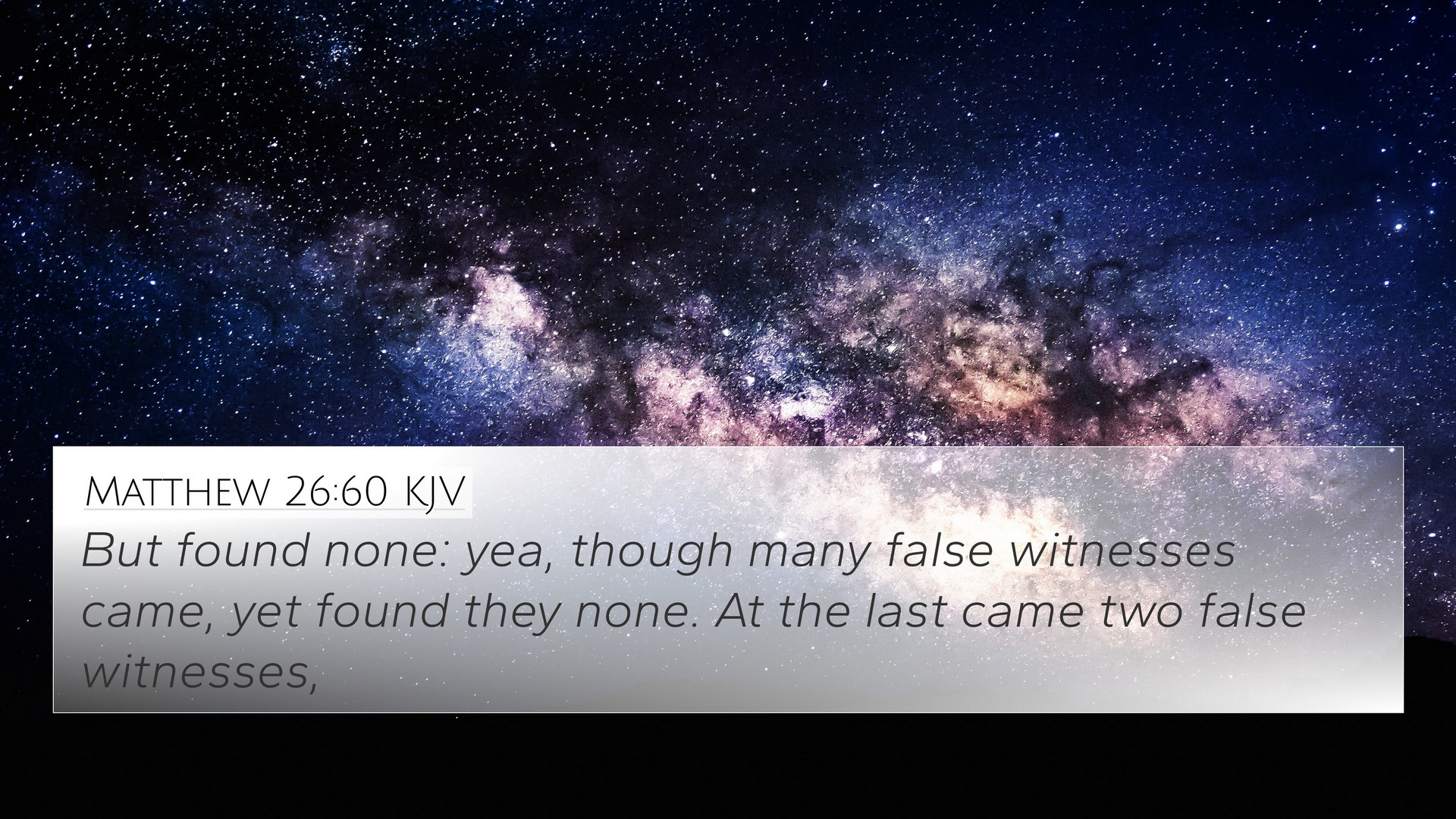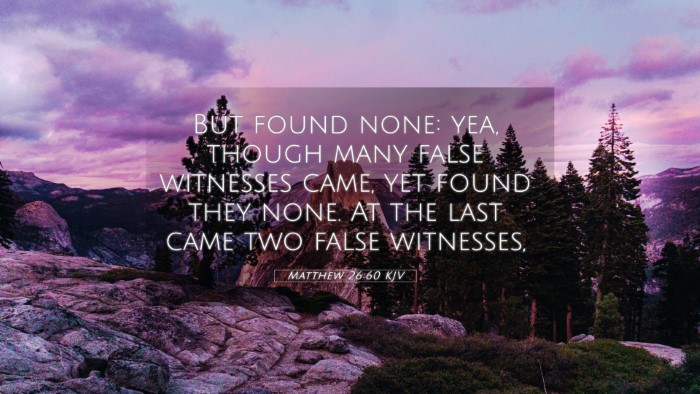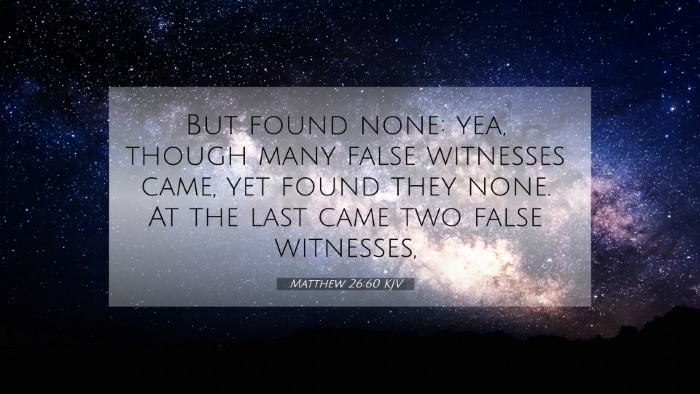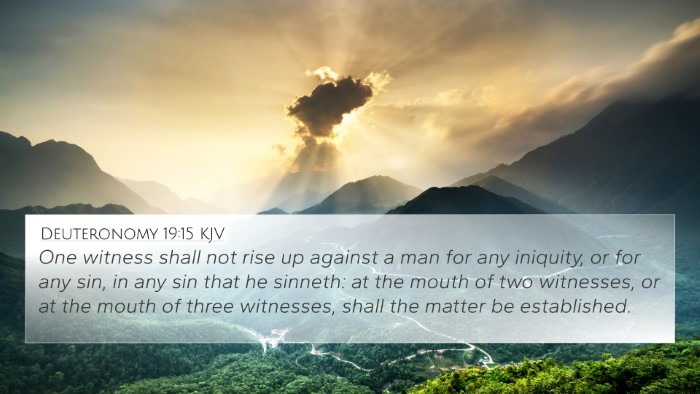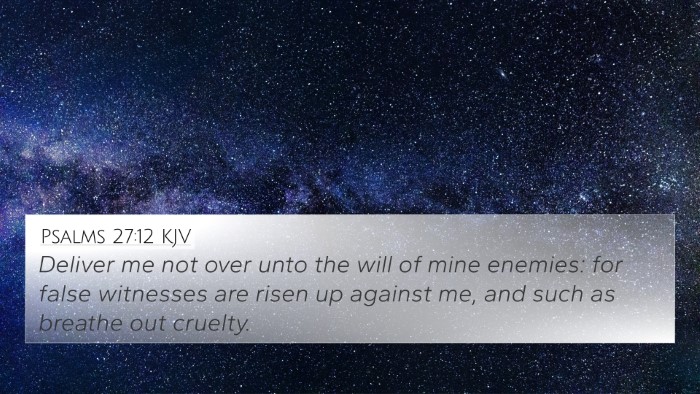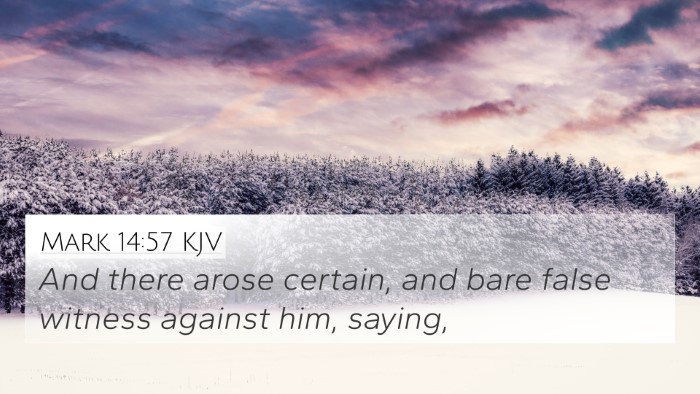Understanding Matthew 26:60
Bible Verse: Matthew 26:60 - "But found none: yea, though many false witnesses came, yet found they none. At the last came two false witnesses."
Summary of the Verse
This verse occurs within the context of Jesus' trial before the Sanhedrin. It highlights the difficulty that the accusers faced in finding credible witnesses to substantiate their charges against Jesus. Despite many attempts by false witnesses to testify against Him, they could not find consistent testimony. This underscores the integrity of Jesus' character and the unjust nature of the accusations being levied against Him.
Commentary Insights
Matthew Henry’s Commentary
Henry notes that the Sanhedrin sought to accuse Jesus of blasphemy and other crimes, but their efforts were thwarted by the lack of credible witnesses. It reflects the broader theme of the injustice faced by the innocent. Henry emphasizes that even false testimonies often reveal the truth, as they ultimately failed in their mission to incriminate Jesus.
Albert Barnes’ Commentary
Barnes emphasizes the significance of the failures of the false witnesses. Their inability to find corroborative evidence against Jesus serves to illustrate His innocence and the desperation of His enemies. Barnes also mirrors the prophetic nature of these events, suggesting they were a part of God’s predetermined plan. He implies that the legal proceedings are a sham and ultimately designed to fulfill Scripture.
Adam Clarke’s Commentary
Clarke provides further detail regarding the legal context, explaining that Jewish law required that at least two witnesses agree on the charges for a conviction. The inability to find such witnesses demonstrates the fabricated nature of the trial. Clarke highlights the moral lesson that emerges: truth is often obscured by corrupt practices.
Bible Verse Cross-References
- Exodus 20:16: "You shall not bear false witness against your neighbor." - This underscores the commandment against dishonesty.
- Matthew 5:11-12: "Blessed are you when others revile you..." - Reflects the attitude of the faithful when facing false accusations.
- Mark 14:56: "For many bore false witness against him, but their testimonies did not agree." - Similar accounts of false testimonies against Jesus.
- John 18:23: "If what I said is wrong, bear witness about the wrong..." - Jesus’ challenge demonstrates His commitment to truth.
- Psalm 27:12: "Give me not up to the will of my adversaries..." - A parallel to Jesus’ plight and unresolved accusations.
- Isaiah 53:7: "He was oppressed, and he was afflicted..." - Prophesies the suffering and injustice faced by Jesus.
- Lamentations 3:34-36: "To subvert a man in his cause, the Lord does not approve." - God’s disapproval of injustice.
Thematic Connections and Biblical Analysis
Cross-Referencing Biblical Texts: This verse serves as a pivotal moment in the Passion narrative of Christ. It highlights several themes, including the nature of falsehood, injustice, and the fulfillment of prophecy. The interplay of these elements not only enriches our understanding of this specific event but also serves as a reminder of the broader narrative of redemption throughout scripture.
Connections Between Bible Verses: The unjust trial of Jesus links to numerous earlier prophecies and later reflections in the New Testament. For example, the theme of false witnesses also appears in the experiences of the Apostles, such as Stephen in Acts 6:13, emphasizing that this pattern of injustice continues throughout church history. The Psalmist’s reflection on the righteousness of God in the face of oppression resonates strongly in this context.
Inter-Biblical Dialogue
The episode of Matthew 26:60 is not merely an isolated event but a focal point for exploring inter-Biblical dialogue. The contrasts between Old Testament law and the practices displayed at Jesus' trial illuminate the growing corruption of the Jewish leadership. The New Testament frequently cross-references these Old Testament themes, highlighting the continuity of God's plan amidst human betrayal and injustice.
Tools for Bible Cross-Referencing
For those interested in deeper study, there are several tools available:
- Bible Concordance: An alphabetical index of words used in the Bible, helping readers to find verses that relate to specific topics.
- Bible Cross-Reference Guide: A resource that groups related scriptures together for comparative study.
- Cross-Referencing Bible Study: Methods that encourage the exploration of themes across different passages.
- Bible Chain References: Links between verses that reveal thematic parallels and scriptural continuity.
Conclusion
In conclusion, Matthew 26:60 not only illustrates the deep injustices faced by Jesus but also serves as a catalyst for understanding larger biblical themes surrounding truth, justice, and divine purpose. By exploring the connections between this verse and others throughout the Bible, we deepen our comprehension of the overarching narrative of faith, prophecy, and fulfillment.
